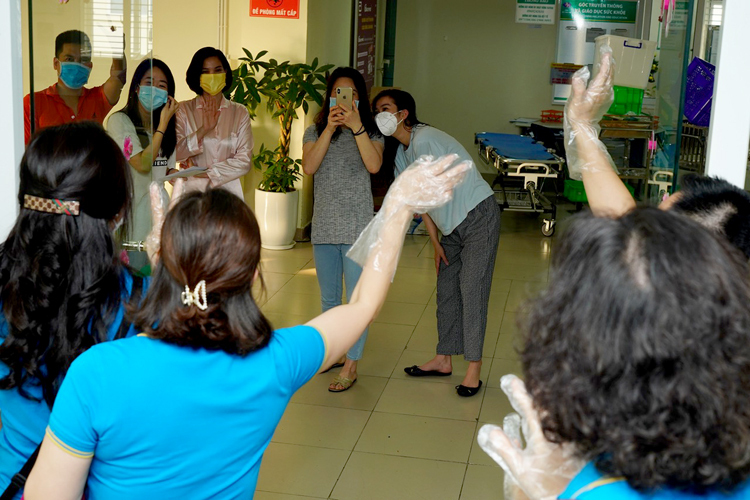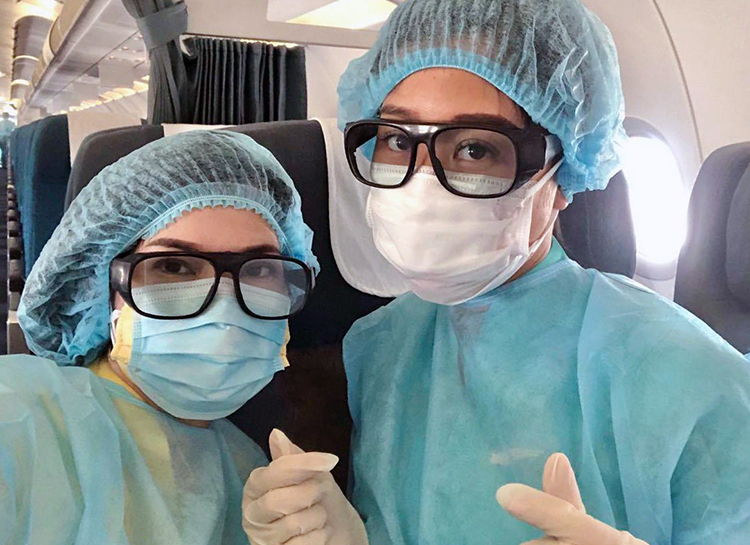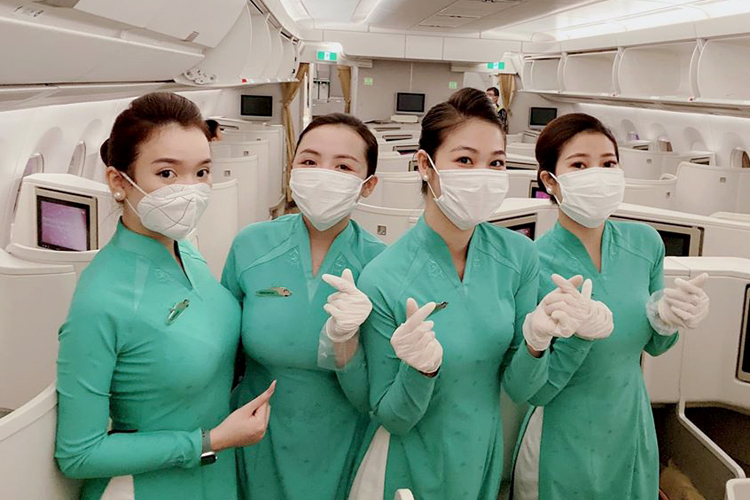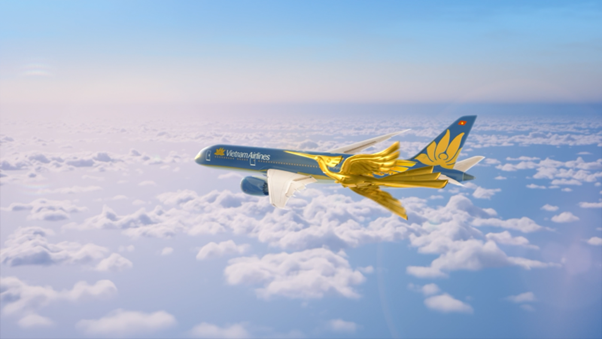At midnight on March 7, the shuttle bus 115 stopped in front of the house in Thuong Thanh, Gia Lam. Mrs. Pham Thi Bac, the chief purser on flight numbered VN54, which had returned on March 2, dragged her suitcase behind her as if she was about to go to work as normal. Leaving with her were four other people suspected of being infected; all were correlated back to the female patient traveling on her flight.
The medical staff members of the National Hospital of Tropical Diseases in Dong Anh District were on the run that night. Quite a lot of people were waiting to have their rooms assigned, no one said anything, or even if they did, it was quick and short. After 40 minutes, Mrs. Pham Thi Bac was led to a room where there were three of her colleagues from the flight crew. They were happy to be together, but they did not rush into conversation.
“Everyone went straight to their beds. Through chat messages, we reminded each other that we had entered the second phase of the war, the fight against cross-infection in an environment where many people are infected or suspected of being infected,” she said.

Mrs. Pham Thi Bac (wearing a yellow mask) and her flight crew wave to the visiting colleagues through the glass window of the quarantine zone on March 8 (Cre: Vu Anh Tuan).
The previous night, she received a call from Head of Cabin Crew Division Phan Ngoc Linh, reporting a patient positive for SARS-CoV-2 on her flight four days before. Mrs. Bac remained calm and asked for the patient’s seat location to visualize things. “She is a business class passenger, in seat numbered 5K. I served her several times,” the 40-year-old flight attendant recalled.
She immediately let go of her two-and-a-half-year-old son and went to the fourth floor to sleep. Feeling restless, she planned out the things she needed to do. Early the next morning, she informed her husband and helper, “I am F1, and I have to be quarantined in the hospital. You and the children are F2 and need to be quarantined at home.” She also explained so that her two children could understand and told them how to react in the event of discrimination. Finally, she asked neighbors and friends to buy food for the family before closing the door for self-quarantine.
On the afternoon of March 8, the flight crew members all tested negative. They received a lot of congratulatory messages and calls. Mrs. Bac immediately called her husband. He would be able to go to work, and the children would not be isolated from neighbors and friends. “The burden was lifted off my shoulders,” she said.
Mrs. Bac is only one of about 700 VNA’ staff members who have been quarantined since the outbreak of the pandemic. To date, the airline has two flight attendants who have tested positive for SARS-CoV-2, and more than 300 staff members have already completed the quarantine period.
During 15 years of working as a flight attendant, she has never experienced such a difficult period. Since the 25th of the Lunar New Year, she has noticed abnormalities in her work. The airline started equipping masks and gloves for employees. The happiness on passengers’ faces was replaced by anxious and wary looks. The international routes and flights were canceled. The domestic flights were not as crowded as they used to be.
In the past, Mrs. Bac could only take a day off every six days. But last February, the number of flights decreased. “Normally, I fly about 90 hours per month, but last month I only flew 70 hours,” she shared.
On February 15, her flight crew was assigned to serve on the flight bringing more than 100 Chinese citizens from Cam Ranh to Chengdu, although airlines in Vietnam had stopped operating all flights to China from early February. At that point, the pandemic was at its peak in the country of billions of people. Many people dissuaded her from working on that flight, but she — like a dedicated soldier who’s willing to fight when the country is in danger — still wished to fulfill her mission.
Everyone on the flight had a different feeling. A Shenzhen passenger, whose husband is from Nha Trang, said in tears, “The pandemic is spreading, but I still have to go back home,” and thanked the crew for helping her reunite with her family.
The aircraft was disinfected and the crew of more than ten people underwent thorough body temperature checks upon arrival. “The Chinese representative wanted to hug us but then backed down. In the context of the pandemic, everyone limited their communication. We showed appreciation through two layers of masks.”

15 years of working has prepared Mrs. Pham Thi Bac for all difficulties (Cre: Pham Thi Bac).
At 11:35 p.m., on March 10, ten minutes before take-off, 22-year-old Nguyen Phuong Ly told her father, “Today’s flight to Germany has been canceled. I guess my flight to England will soon be canceled, too.” Ly was concerned that after the trip, she might have to be quarantined if there were people infected on the plane. “It’s okay. Quarantine is your responsibility to yourself and the community,” her father encouraged.
Ly’s flights during this period are all to the hearts of the pandemic like France, Germany, or England. The encouraging messages from her father before each flight have helped the young girl stay strong. Ly and the flight crew were always on standby for abnormalities and spent the entire night awake on that day’s flight to France.
After 11 hours flying, Phuong Ly landed at Charles de Gaulle airport in Paris — a city with more than 1,100 people with Covid-19 and 21 death cases. Ly and her colleagues stayed in the hotel upon arrival. They had rice with simmered filet mignon, braised beef, lolot rolls, and stir-fried kohlrabi made by Ly’s mother for dinner. Then the whole team went to bed early to fly back home the next day. “We always strictly adhere to the quarantine regulations when spending the night in the affected area,” Phuong Ly talked about the new “military order,” in addition to the regulations of wearing masks, and gloves, etc.
Majored in economics, Phuong Ly was originally oriented to work in an economic corporation or a foreign company, but as a young girl who loves to explore, she wanted to conquer the skies. She was once asked in an interview, “You look like a ‘spoiled princess,’ do you have what it takes to be a flight attendant?” She did not answer the question but proved it through her commendable efforts over the past two years.
“I vomited so many times when the plane wobbled in bad weather. During peak periods, I often have another flight schedule as soon as I land.”

Phuong Ly (first on the left) with her colleagues on the flight on March 10 (Cre: Phuong Ly).
Being a flight attendant usually requires constant communication and the application of cosmetics. When flight attendants first started wearing masks, passengers, especially foreign ones, felt very strange. In Europe, where a large number of people still think of masks as “symbolic of Asians or the sick,” Ly and her colleagues felt discriminated against. People were asking, “Are you sick?” “Are you Chinese?”
“Working as a flight attendant means that you have to fly with one crew today and another tomorrow, so protecting yourself means protecting your family, colleagues, and passengers,” she said. Despite getting scratches, earaches, and fatigue due to the lack of air from wearing masks for a long time, she still has to rely on this protection measure during the pandemic.
Since the outbreak of the Covid-19 pandemic, flight attendant Nguyen Trong Vinh’s airline has canceled flights to China, Korea, and now Europe. It can be assumed that the workload of the 31-year-old flight attendant will be reduced if the situation persists. However, in just one week from March 2 to March 9, three flight crews of his airline in Hanoi have been quarantined, causing a lot of disturbance in his work. Vinh must then be ready to take over the work of his quarantined colleagues.
On March 14, he was on four domestic flights, twice as normal. In just the last three days, Vinh was on ten flights, with more than 30 hours. Currently, flights to Europe are a concern for every flight attendant. Vinh is no exception. “But if I don’t go, my colleagues will have to face the same risks,” he said.
Vinh was off work last weekend. He spent most of his time sleeping. He even had to restrain himself from playing with his children because he “did not know whether he had been infected.” On the evening of March 16, Vinh was on the flight to Germany, where there were 6,000 reported infected people. He knew that it would be a stressful flight.
“One infected, and the entire flight crew will be quarantined for 14 days,” the flight attendant with five years of experience warned himself. However, he was less worried when being equipped with special protective equipment. Furthermore, the passengers were interviewed, had their body temperatures were measured, and they wore masks and gloves during the flight.
Over the past two months, VNA has operated flights to bring Vietnamese citizens back home from Wuhan and South Korea. Currently, there are up to half a million passengers in Europe wanting to return to Vietnam. Vinh and Ly will fly tonight, Mrs. Bac’s quarantine period is also coming to an end so that she and her colleagues can continue to fight in this “no one left behind” battle.
Cre: Vnexpress
Nguyen Mai Huong-COMM











